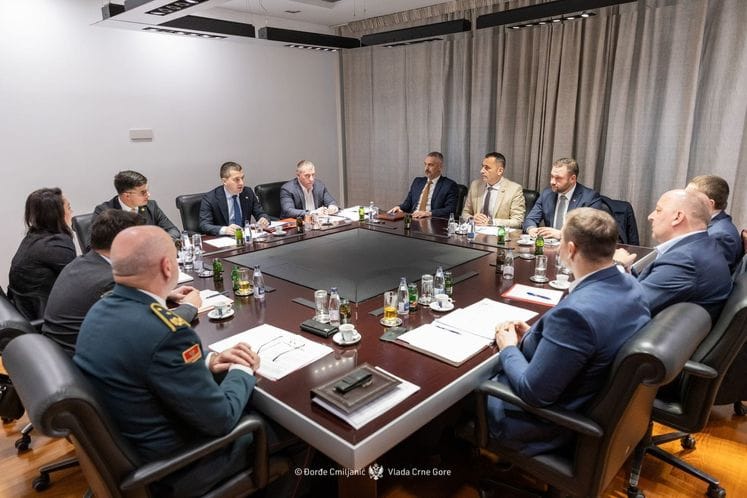- Government of Montenegro
Operational Coordination Bureau of the Intelligenc...
Operational Coordination Bureau of the Intelligence and Security Sector holds its seventh session

The Operational Coordination Bureau of the Intelligence and Security Sector held its seventh session, attended by Minister of the Interior Danilo Šaranović and Acting Assistant Director of the Police Directorate Lazar Šćepanović. During the session, several pressing issues within the Bureau's purview were discussed.
The Bureau, while analyzing the security situation and the persistence of challenges, predominantly caused by conflicts among high-risk organized crime groups, emphasized the double homicide committed on 6 November in Podgorica. This incident, in which both victims and the suspect, who admitted to a prior homicide confirmed by evidence, had been released from custody due to the failure to deliver first-instance verdicts within three years, highlighted ongoing concerns. The Bureau reiterated its previous warnings, including those made during the October session, that the lack of efficiency in judicial proceedings is a key enabler for organized crime activities and complicates the security situation. The failure to deliver timely first-instance verdicts allows numerous suspects, including those charged with severe crimes, to leave custody, increasing both the number of potential targets and perpetrators of such crimes.
In this regard, the Bureau urged the urgent consideration and adoption of amendments to the Criminal Procedure Code to extend the detention period for suspects. It also called for comprehensive amendments to the Criminal Procedure Code and other systemic laws to create legislative conditions to prevent procedural abuses and ensure effective and efficient judicial proceedings.
The Bureau emphasized the inadequacy of judicial responses to violations of supervision measures imposed on suspects. Given the current legal framework, the Bureau insisted on establishing violations of supervision measures as mandatory grounds for detention. This should involve introducing sanctions for such violations by defining them as specific criminal offenses under the criminal law.
Acknowledging significant efforts despite challenges and resource constraints, the Bureau directed the intelligence and security sector bodies to intensify their collaborative activities aimed at preventing serious crimes and neutralizing organized crime groups. It emphasized the need for continuous monitoring and proactive measures, including against foreign criminal groups.
The Bureau praised the Police Directorate, particularly the Sector for Combating Crime and regional security centers, for their November achievements. These included preventing and solving multiple serious crimes, including homicides and attempted homicides, some linked to organized crime groups. A notable success was the swift resolution of the double homicide in Podgorica on 6 November 2024. The Bureau expressed satisfaction with the professionalism and dedication of the police officers involved and commended their work in combating economic crime.
The Bureau acknowledged the adoption of amendments to the Law on Internal Affairs and welcomed the Ministry of the Interior's progress in implementing GRECO recommendations and harmonizing secondary legislation. It also expressed expectations for a public job announcement in December for employment within the Ministry and Police Directorate, marking a crucial step toward addressing significant staffing shortages.
The Bureau reviewed progress on expanding public space video surveillance systems, the activities of the working group drafting the new Traffic Safety Law, and the implementation of a test version of stationary radar systems. Additionally, it reviewed reports from interdepartmental working teams and considered initiatives for forming new ones.
In accordance with the Law on the Fundamentals of the Intelligence and Security Sector, the Bureau established an interdepartmental working team responsible for planning and implementing EMPACT operational activities coordinated by EUROPOL. This initiative marks the first interdepartmental approach to these activities, aligning the operations of the intelligence and security sector bodies with EUROPOL policies and contributing to the fulfillment of requirements under Chapter 24 of the EU accession negotiations.
